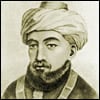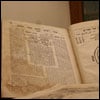NEW YORK (JTA) — The Lubavitch Movement has become universally recognized as the most outgoing, innovative and activist movement on the Jewish scene. Its outreach programs, for example, among Jewish students of college campuses in the United States and around the world, and its positive effect on all types of Jews from yuppies to the alienated and disenchanted, have been extremely successful.
So successful have they been that other groups which years ago scoffed at Lubavitch and cast aside any prospects for its success, have themselves now also taken to reaching out to unaffiliated Jews.
Lubavitch more than any other group should be given credit for bringing about the current renaissance of interest in Judaism, and for creating the surging desire by large numbers of uninformed Jews to find Judaism's meaningfulness and how it can be lived and adapted to modern day life and thought.
Its success is legendary. Hardly any sizeable Jewish community in the world today doesn't have some Lubavitch institution, facility or representative. They reach out to Jews in their homes and on the streets with their 'Mitzvah-mobiles' — which they call 'tanks' for the 'war against assimilation.' They have stirred up a resurgence of interest in Judaism and its practice, second to none in modern Jewish history.
The driving force behind all this dynamism and success is of course their patriarchal 83 year old leader, the Lubavitcher Rebbe, Rabbi Menachem M. Schneerson. Anyone knowledgeable of Jewish affairs knows that the Rebbe's influence transcends the world of Chasidism and penetrates the bloodstream of Jewish life, thought and activity.
On the tenth day of Shevat this year the Rebbe completed 35 years at the helm of the Lubavitch Movement, and on the 11th day of Nissan, four days before Passover, he will mark his 83rd birthday.
In recent years the Lubavitcher Rebbe has extended his concern and influence even beyond the Jewish community. In many of his public appearances, now telecast live via satellite across the United States and in other countries, he speaks to the entire human race. He talks about education and the control of crime. He points to the essence of education that it is not merely the accumulation of knowledge, but character building and learning how to live as well. He speaks of the importance of faith and prayer for all peoples, and in terms that are relevant to all mankind.
Lubavitchers claim that through the television medium the Rebbe reaches in any one address at least six million viewers. But regardless of the precise numbers, his message is in great measure universal and large numbers of non-Jews are listening and watching with interest to what he has to say.
He bases his universal call on the ruling of Maimonides, the great Jewish philosopher, physician and codifier (1035-1104) that Jews have the obligation to spread the knowledge and significance of the seven Noahide Laws to the entire human race.
I have previously written of the Rebbe that he is the Maimonides of this generation, a veritable 'Guide to the Perplexed.' Countless thousands of people from all shades and backgrounds seek his sage counsel and guidance on matters that touch their lives.
Despite the activist manifestations of the Lubavitch Movement, it should be remembered that Lubavitch is primarily an intellectual movement. Lubavitch is also known as 'Chabad.' Lubavitch is the name of the small Russian townlet where the leaders of the movement lived for over 100 years. The term 'Chabad', which describes Lubavitcher philosophy, is an acronym for the three general parts of the intellect — Chochma, Bina and Daat, which translate as wisdom, knowledge and understanding respectively. So that Lubavitch and Chabad are really synonymous. Its teachings and philosophy range from the profound, mystical and esoteric to the very pragmatic and applicable. In fact, it seeks to connect both ends, the abstract and remote with the practical and real.
It is interesting to note that a few years ago the Lubavitcher discovered the whereabouts of hundreds of Chabad Chassidic manuscripts written by several of the previous Rebbes. These writings were thought to be lost during the World War II upheaval in Europe. The Rebbe succeeded to bring these manuscripts and books 'home,' and they are now part of his historic archives.
In recent years they have published more than 120 hard covered volumes of these writings at the Rebbe's behest and direction, including some 40 volumes of the writings of Rabbi Schneur Zalman of Liadi (1745-1812) progenitor of the Chabad-Lubavitch Movement.
The Kehot Publication Society, one of the Lubavitcher publishing houses, is the world's largest publisher of Chassidic literature. Aside from its hundreds of hard cover scholarly volumes, a huge flow of journals and periodicals flow from their presses.
So for all their activism and visibility the Lubavitcher are still very much the 'people of the book.'
Getting back to my mention of Maimonides. During the last Passover holiday the Lubavitcher Rebbe proposed to his followers to study the complete text of Maimonides magnum opus — 'Mishneh Torah' — during the year, so that it be completed by the eve of Passover, the day before the approaching Passover, which marks the 850th birthday of the Rambam — Maimonides.
In order to complete the Mishneh Torah during the year, one had to study three chapters every day, which can at times prove to be a difficult task. Nevertheless, thousands, and perhaps tens of thousands, took to this task. Hebrew book stores all over the world soon ran out of stock of the Maimonides' text.
On the 11th of Nissan, just four days before Passover, the Rebbe will become 83. As every year on his birthday he will deliver a public address at Lubavitch World Headquarters in Brooklyn, and as has been the case in recent years, it will be broadcast and telecast live via satellite across the United States, to Israel and other countries.
It is anticipated that during his address the Rebbe will deliver a scholarly dissertation marking the completion of the year's study of the Maimonides text, which is expected to draw the world-wide attention of leading Rabbis and Torah scholars.
Some Lubavitcher followers feel that after the grand finale of the Maimonides text on the Rebbe's birthday, the Rebbe will suggest that they study it again, perhaps with some variation of commentaries.






Start a Discussion